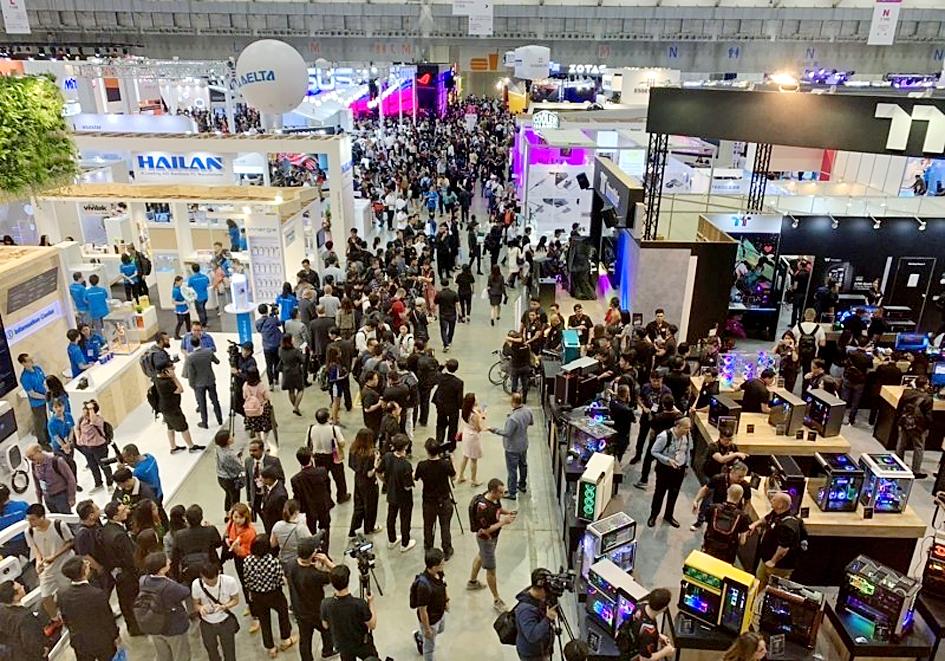Computex Taipei’s organizers have canceled the annual computer and technology trade shows due to lingering concerns over the COVID-19 pandemic and large-scale travel restrictions, the Taiwan External Trade Development Council (TAITRA, 外貿協會) said.
Originally scheduled to take place earlier this month, Computex was initially postponed to late September as the pandemic wreaked havoc across the globe.
“While Taiwan is no longer under the threat of COVID-19, the virus is still spreading in 187 other countries with more than 7.35 million cases worldwide,” TAITRA said in a statement

Photo: Lin Chin-hua, Taipei Times
Along with the heavy economic effects of the pandemic, travel restrictions and lockdown measures which are in place to prevent future transmissions of the virus might prevent overseas participants and press from traveling to Taiwan, it said.
“Preserving the health and safety of Computex’s participants remain our top priority... After careful deliberation, we have decided to cancel this year’s show,” TAITRA said.
Pointing to Taiwan’s closed borders, which greatly contributed to the nation’s success in combating the coronavirus, TAITRA chairman James Huang (黃志芳) said the potential risk of new cases from abroad remains high.
“Nobody can afford to shoulder this kind of responsibility” of new COVID-19 cases in the nation, Huang said.
Even if Taiwan has the capacity to test each and every one of Computex’s overseas visitors, the two-week quarantine is more than enough to dissuade the majority of participants, Huang said.
Nevertheless, the trade show in September would hold online exhibitions and forums, he added.
Computex, one of the largest trade shows of its kind, is cohosted by the Computer Association and attracts more than 40,000 visitors annually.
The next show is scheduled for June 1 to June 5 next year.

South Korea’s equity benchmark yesterday crossed a new milestone just a month after surpassing the once-unthinkable 5,000 mark as surging global memory demand powers the country’s biggest chipmakers. The KOSPI advanced as much as 2.6 percent to a record 6,123, with Samsung Electronics Co and SK Hynix Inc each gaining more than 2 percent. With the benchmark now up 45 percent this year, South Korea’s stock market capitalization has also moved past France’s, following last month’s overtaking of Germany’s. Long overlooked by foreign funds, despite being undervalued, South Korean stocks have now emerged as clear winners in the global market. The so-called “artificial intelligence

NEW IDENTITY: Known for its software, India has expanded into hardware, with its semiconductor industry growing from US$38bn in 2023 to US$45bn to US$50bn India on Saturday inaugurated its first semiconductor assembly and test facility, a milestone in the government’s push to reduce dependence on foreign chipmakers and stake a claim in a sector dominated by China. Indian Prime Minister Narendra Modi opened US firm Micron Technology Inc’s semiconductor assembly, test and packaging unit in his home state of Gujarat, hailing the “dawn of a new era” for India’s technology ambitions. “When young Indians look back in the future, they will see this decade as the turning point in our tech future,” Modi told the event, which was broadcast on his YouTube channel. The plant would convert

‘SEISMIC SHIFT’: The researcher forecast there would be about 1.1 billion mobile shipments this year, down from 1.26 billion the prior year and erasing years of gains The global smartphone market is expected to contract 12.9 percent this year due to the unprecedented memorychip shortage, marking “a crisis like no other,” researcher International Data Corp (IDC) said. The new forecast, a dramatic revision down from earlier estimates, gives the latest accounting of the ongoing memory crunch that is affecting every corner of the electronics industry. The demand for advanced memory to power artificial intelligence (AI) tasks has drained global supply until well into next year and jeopardizes the business model of many smartphone makers. IDC forecast about 1.1 billion mobile shipments this year, down from 1.26 billion the prior

People stand in a Pokemon store in Tokyo on Thursday. One of the world highest-grossing franchises is celebrated its 30th anniversary yesterday.